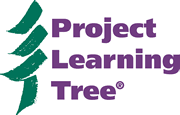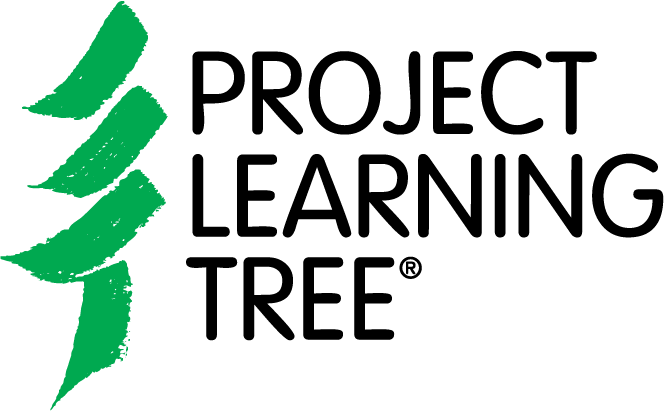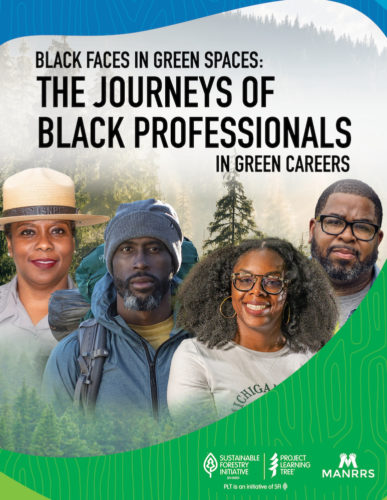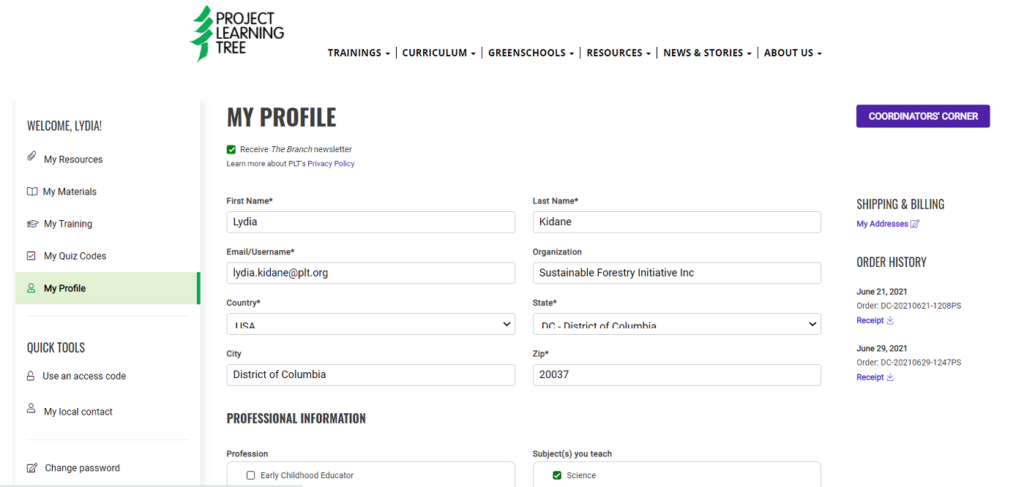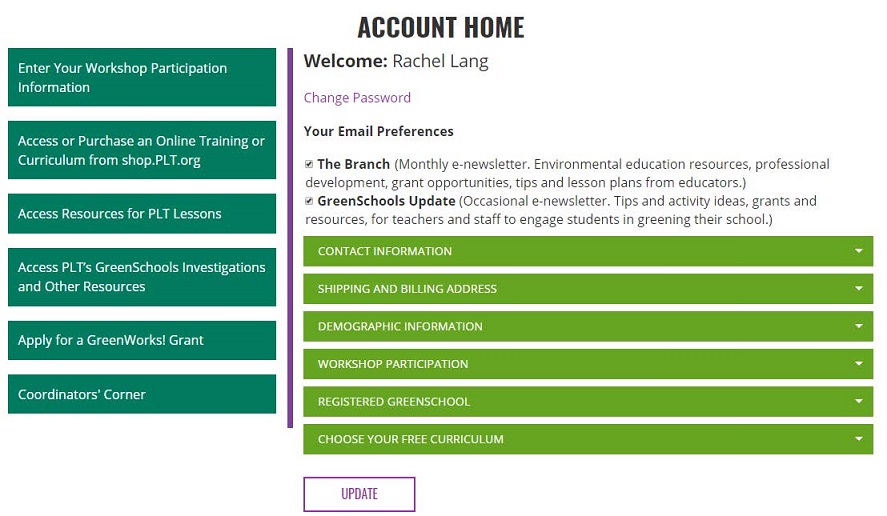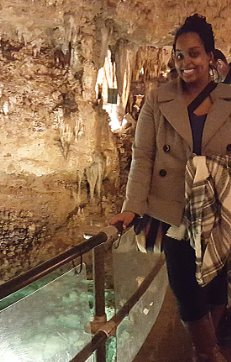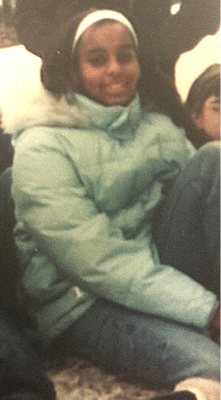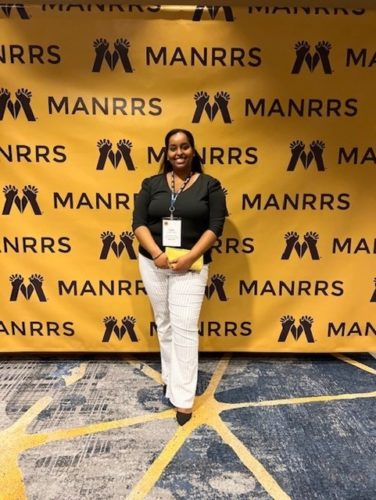
I hadn’t heard about Minorities in Agriculture, Natural Resources and Related Sciences (MANRRS) until the Sustainable Forestry Initiative (SFI) formed a partnership with them in 2021.
I’ve worked in the forest and conservation sector for seven years, most recently as SFI and PLT’s Education Programs Coordinator, where I take care of customer inquiries, manage PLT’s product inventory, and help maintain our shop and e-commerce sites. I completed a Bachelor of Arts in urban sustainability at the University of the District of Columbia (UDC), and I am enrolled in a graduate program in water resources management at UDC. But I didn’t know I was missing out on this awesome organization and the resources they offer!
When SFI and MANRRS announced their new partnership aimed at ensuring young Black Americans have greater opportunities for rewarding careers in the forest and conservation sector, I started looking into MANRRS right away. I learned that their mission is to promote academic and professional advancement by empowering minorities in agriculture, natural resources, and related sciences. And I saw that they had a chapter on my UDC campus, so I reached out to previous chapter officers.
I quickly realized that I wanted to get involved, so I joined the UDC chapter of MANRRS, and was elected as the Graduate Student Advisor this spring! As the UDC MANRRS Graduate Student Advisor, I answer student’s questions, plan events for upcoming semesters, support recruitment efforts, and schedule skills trainings so students can be successful on the job.
Broadening horizons and changing the narrative: MANRRS36
I recently had the opportunity to participate in MANRRS’s 36th national conference in Jacksonville, FL. This year’s theme was broadening horizons and changing the narrative; a theme focused on highlighting the diverse people supporting conservation and their interest in the natural resources sector.
I was so excited to participate in an in-person event and connect with like-minded students, professionals, and universities, especially after the last couple years of remote connections. I particularly enjoyed the Graduate Student Business Meeting—it was the first and only time at the conference that all the graduate students were together. My program at UDC was supposed to be very hands-on, but because of COVID-19, I haven’t been able to do much in-person, so I really enjoyed being able to meet and share with people who were going through similar experience.
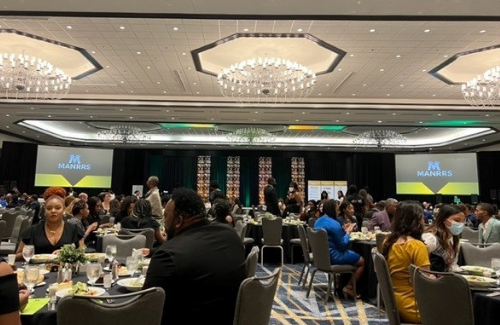 I listened to inspirational speakers and visited the Career Expo and Fair, where 50+ organizations and recruiters provided onsite interviews and promoted internship and fellowship opportunities. I participated in workshops, like the Talent Development Pipeline for Farms of the Future session run by AgLaunch. And there were lots of fun networking opportunities, like the Closing Gala, where we all got dressed up and found out about what scholarships were awarded, who won the research and speech contests, and the newly elected MANRRS national officers.
I listened to inspirational speakers and visited the Career Expo and Fair, where 50+ organizations and recruiters provided onsite interviews and promoted internship and fellowship opportunities. I participated in workshops, like the Talent Development Pipeline for Farms of the Future session run by AgLaunch. And there were lots of fun networking opportunities, like the Closing Gala, where we all got dressed up and found out about what scholarships were awarded, who won the research and speech contests, and the newly elected MANRRS national officers.
During the conference, I met countless professionals in the conservation, agriculture, and environmental science sectors. I enjoyed hearing about the similar events that both professionals and students experience in academia and the forestry and natural resources sector. We talked about being the only student in a program who is not white and our concerns about joining the workforce. Everyone was supportive and shared their experience and advice—plus, industry professionals came to the conference to talk about how they’re trying to change their hiring and retention objectives and what they’re doing to increase diversity in their organizations.
MANRRS, SFI, and PLT
My experience at MANRRS36 reaffirmed my commitment and desire to work to advance access to green careers for everyone. It made me glad to know that resources like PLT’s Green Jobs: Exploring Forest Careers guide and online personality quiz are out there to help inspire the next generation of forest and conservation leaders and spread the word about all the cool jobs that are available.
SFI and MANRRS are exploring the full spectrum of needs across a green career pathway—including recruitment, awareness, mentorship, and career opportunities—collectively designed to help the forest and conservation sector recruit, retain, and advance a diverse and resilient workforce.
Through the partnership, we will tailor career pathways and skill-building resources to highlight the journeys of Black American professionals working in conservation, and develop a mentorship program in the USA for young Black Americans that is based on the success of PLT Canada’s industry-leading mentorship program.
SFI, PLT, and MANRRS are already working to create one of these resources with the SFI-PLT-MANRRS Black Faces in Green Spaces: The Journeys of Black Professionals in Green Careers guide.
The guide highlights 22 Black Americans who share their personal stories about finding their passions and overcoming challenges, and offer advice to the next generation about exploring their own careers in the forest and conservation sector.
Create an account and download or buy an individual copy, purchase a box of guides, or donate a box of Journeys guides to a Historically Black College and University (HBCU) or Minorities in Agriculture, Natural Resources, and Related Sciences (MANRRS) chapter.
